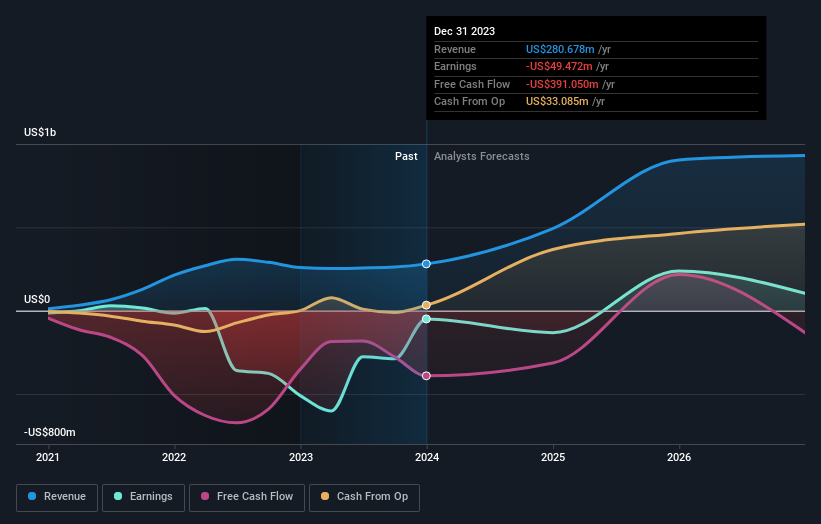Stock Analysis
- United States
- /
- Software
- /
- NasdaqCM:RIOT
Institutions profited after Riot Platforms, Inc.'s (NASDAQ:RIOT) market cap rose US$175m last week but retail investors profited the most

Key Insights
- Riot Platforms' significant retail investors ownership suggests that the key decisions are influenced by shareholders from the larger public
- 40% of the business is held by the top 25 shareholders
- Insiders have been selling lately
To get a sense of who is truly in control of Riot Platforms, Inc. (NASDAQ:RIOT), it is important to understand the ownership structure of the business. And the group that holds the biggest piece of the pie are retail investors with 51% ownership. Put another way, the group faces the maximum upside potential (or downside risk).
Following a 6.1% increase in the stock price last week, retail investors profited the most, but institutions who own 40% stock also stood to gain from the increase.
Let's take a closer look to see what the different types of shareholders can tell us about Riot Platforms.
See our latest analysis for Riot Platforms

What Does The Institutional Ownership Tell Us About Riot Platforms?
Institutional investors commonly compare their own returns to the returns of a commonly followed index. So they generally do consider buying larger companies that are included in the relevant benchmark index.
As you can see, institutional investors have a fair amount of stake in Riot Platforms. This can indicate that the company has a certain degree of credibility in the investment community. However, it is best to be wary of relying on the supposed validation that comes with institutional investors. They too, get it wrong sometimes. It is not uncommon to see a big share price drop if two large institutional investors try to sell out of a stock at the same time. So it is worth checking the past earnings trajectory of Riot Platforms, (below). Of course, keep in mind that there are other factors to consider, too.

Hedge funds don't have many shares in Riot Platforms. The Vanguard Group, Inc. is currently the company's largest shareholder with 8.5% of shares outstanding. For context, the second largest shareholder holds about 6.1% of the shares outstanding, followed by an ownership of 3.2% by the third-largest shareholder. Jason Les, who is the third-largest shareholder, also happens to hold the title of Member of the Board of Directors.
On studying our ownership data, we found that 25 of the top shareholders collectively own less than 50% of the share register, implying that no single individual has a majority interest.
While it makes sense to study institutional ownership data for a company, it also makes sense to study analyst sentiments to know which way the wind is blowing. Quite a few analysts cover the stock, so you could look into forecast growth quite easily.
Insider Ownership Of Riot Platforms
While the precise definition of an insider can be subjective, almost everyone considers board members to be insiders. The company management answer to the board and the latter should represent the interests of shareholders. Notably, sometimes top-level managers are on the board themselves.
Insider ownership is positive when it signals leadership are thinking like the true owners of the company. However, high insider ownership can also give immense power to a small group within the company. This can be negative in some circumstances.
We can report that insiders do own shares in Riot Platforms, Inc.. It is a pretty big company, so it is generally a positive to see some potentially meaningful alignment. In this case, they own around US$244m worth of shares (at current prices). It is good to see this level of investment by insiders. You can check here to see if those insiders have been buying recently.
General Public Ownership
The general public -- including retail investors -- own 51% of Riot Platforms. With this amount of ownership, retail investors can collectively play a role in decisions that affect shareholder returns, such as dividend policies and the appointment of directors. They can also exercise the power to vote on acquisitions or mergers that may not improve profitability.
Next Steps:
While it is well worth considering the different groups that own a company, there are other factors that are even more important. Like risks, for instance. Every company has them, and we've spotted 3 warning signs for Riot Platforms (of which 1 can't be ignored!) you should know about.
If you would prefer discover what analysts are predicting in terms of future growth, do not miss this free report on analyst forecasts.
NB: Figures in this article are calculated using data from the last twelve months, which refer to the 12-month period ending on the last date of the month the financial statement is dated. This may not be consistent with full year annual report figures.
Valuation is complex, but we're helping make it simple.
Find out whether Riot Platforms is potentially over or undervalued by checking out our comprehensive analysis, which includes fair value estimates, risks and warnings, dividends, insider transactions and financial health.
View the Free AnalysisHave feedback on this article? Concerned about the content? Get in touch with us directly. Alternatively, email editorial-team (at) simplywallst.com.
This article by Simply Wall St is general in nature. We provide commentary based on historical data and analyst forecasts only using an unbiased methodology and our articles are not intended to be financial advice. It does not constitute a recommendation to buy or sell any stock, and does not take account of your objectives, or your financial situation. We aim to bring you long-term focused analysis driven by fundamental data. Note that our analysis may not factor in the latest price-sensitive company announcements or qualitative material. Simply Wall St has no position in any stocks mentioned.
About NasdaqCM:RIOT
Excellent balance sheet and slightly overvalued.


